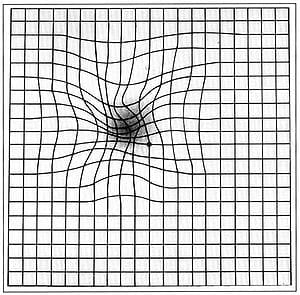
The loss of eyesight, often caused by retinal degeneration, is a life-altering health issue for many people, especially as they age.
But a new development toward a prosthetic retina could help counter conditions that result from problems with this crucial part of the eye. Scientists published their research on a new device, which they tested on tissue from laboratory animals, in the ACS journal Nano Letters.
Yael Hanein and colleagues point out that a growing range of medical devices has become available to treat conditions, including visual impairment, that involve sending sensory signals to the brain. Patients with one type of eye disorder called age-related macular degeneration (AMD), for example, could potentially benefit from such a device, they say. AMD usually affects people age 60 or older who have damage to a specific part of the retina, limiting their vision. Scientists are trying different approaches to develop an implant that can “see” light and send visual signals to a person’s brain, countering the effects of AMD and related vision disorders. But many attempts so far use metallic parts, cumbersome wiring or have low resolution. The researchers, an interdisciplinary team from Tel Aviv University, the Hebrew University of Jerusalem Centers for Nanoscience and Nanotechnology and Newcastle University, wanted to make a more compact device.
The researchers combined semiconductor nanorods and carbon nanotubes to create a wireless, light-sensitive, flexible film that could potentially act in the place of a damaged retina. When they tested it with a chick retina that normally doesn’t respond to light, they found that the film absorbed light and, in response, sparked neuronal activity. In comparison with other technologies, the researchers conclude theirs is more durable, flexible and efficient, as well as better able to stimulate neurons.
The Latest on: Artificial retina
[google_news title=”” keyword=”Artificial retina” num_posts=”10″ blurb_length=”0″ show_thumb=”left”]
via Google News
The Latest on: Artificial retina
- Eye Care Newson April 26, 2024 at 5:00 pm
Feb. 27, 2024 — Researchers have developed a simulator that enables artificial visual observations ... Jan. 11, 2024 — With human retinas grown in a petri dish, researchers discovered how ...
- Enter Robots: Are We Ready?on April 25, 2024 at 11:09 am
Beyond robotic limbs is the development of sensory robotics: an artificial retina/eye allowing the blind to see again or an artificial cochlea to grant hearing to the deaf (1,2). Add the newest ...
- Enter Robots, Are We Ready?on April 24, 2024 at 5:00 pm
Beyond robotic limbs is the development of sensory robotics: an artificial retina/eye allowing the blind to see again or an artificial cochlea to grant hearing to the deaf (1,2). Add the newest ...
- Are bionic eyes really in sight?on April 21, 2024 at 5:00 pm
Scientists say an artificial retina they have developed could help thousands of people who have lost their sight because of diseases or accidents. The eye, which will be given to a group of five ...
- NEI applies artificial intelligence to OCT for retinal imagingon April 16, 2024 at 4:43 am
The research, published in Nature Communications Medicine, builds on work at NEI to enhance OCT via adaptive optics (AO), known for some time to be a route towards improved image quality achievable ...
- The Next Frontier for Brain Implants Is Artificial Visionon April 14, 2024 at 10:00 pm
Without an intact retina or optic nerve ... the neuroscientist leading the study. He stresses that artificial vision is “not like seeing again.” His main goal is to improve orientation ...
- AI makes retinal imaging 100 times faster, compared to manual methodon April 10, 2024 at 2:04 am
Vineeta Das, NEI Clinical and Translational Imaging Section, explains how artificial intelligence improves imaging of the eye’s light-sensing retina. Researchers at the National Institutes of ...
- AI makes retinal imaging 100 times faster, compared to manual methodon April 9, 2024 at 5:00 pm
The work appears in Communications Medicine. "Artificial intelligence helps overcome a key limitation of imaging cells in the retina, which is time," said Johnny Tam, Ph.D., who leads the Clinical ...
- How to watch a solar eclipse safelyon April 2, 2024 at 4:59 pm
The sun produces most of Earth's ultraviolet (UV) light, though tanning beds and some artificial lights can ... The eyes’ retinas don’t have any pain receptors, so people often have no idea ...
via Bing News










